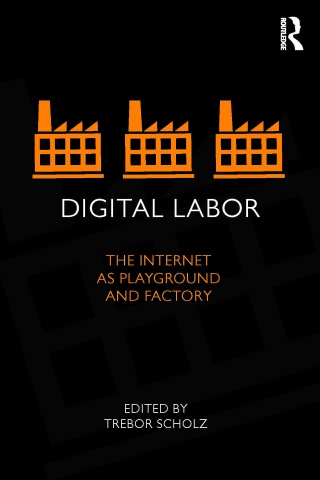Trebor Scholz (ed.): Digital Labor: The Internet as Playground and Factory (2012)
Filed under book | Tags: · biopolitics, gift economy, internet, labour, neoliberalism, participation, play, playbour, politics, social media, technology, value, web, youtube

“Digital Labor calls on the reader to examine the shifting sites of labor markets to the Internet through the lens of their political, technological, and historical making. Internet users currently create most of the content that makes up the web: they search, link, tweet, and post updates—leaving their “deep” data exposed. Meanwhile, governments listen in, and big corporations track, analyze, and predict users’ interests and habits.
This unique collection of essays provides a wide-ranging account of the dark side of the Internet. It claims that the divide between leisure time and work has vanished so that every aspect of life drives the digital economy. The book reveals the anatomy of playbor (play/labor), the lure of exploitation and the potential for empowerment. Ultimately, the 14 thought-provoking chapters in this volume ask how users can politicize their troubled complicity, create public alternatives to the centralized social web, and thrive online.”
Contributors: Mark Andrejevic, Ayhan Aytes, Michel Bauwens, Jonathan Beller, Patricia Ticineto Clough, Sean Cubitt, Jodi Dean, Abigail De Kosnik, Julian Dibbell, Christian Fuchs, Lisa Nakamura, Andrew Ross, Ned Rossiter, Trebor Scholz, Tizania Terranova, McKenzie Wark, and Soenke Zehle.
Publisher Routledge, 2012
ISBN 0415896959, 9780415896955
258 pages
Reviews: Sebastian Sevignani (triple C, 2013), Andreas Wittel (Inf, Comm & Soc, 2014), Stephanie Anne Brown (Transformative Works & Cult, 2014), Gregory J. Downey (J Assoc Info Sci & Tech, 2015).
Conference (2009, from Archive.org)
Next conference (14-16 Nov 2014, CfP)
Publisher
continent. journal, Special Issue (3.2): Drift (2013)
Filed under journal | Tags: · art, biopolitics, theory
continent. maps a topology of unstable confluences and ranges across new thinking, traversing interstices and alternate directions in culture, theory, biopolitics and art.
Contributors to this issue: Berit Soli-Holt, April Vannini, Jeremy Fernando, R H Jackson, Gina Rae Foster, Bronwyn Lay, Patricia Reed, David Prater, Laura Dean, Jesse McClelland, Amara Hark Weber, Isaac Linder, Ashley D. Hairston, and Sean Smith.
Edited by Berit Soli-Holt
Creative Commons Attribution 3.0 License
ISSN 2159-9920
View online (HTML and PDF articles)
Comment (0)Stephen Wright (ed.): Dataesthetics: How to Do Things with Data (2006) [English/Croatian]
Filed under book | Tags: · art, biopolitics, cartography, data visualisation, database

Data has become the most pervasive and intangibly invasive feature of contemporary life; of life become data. Life systems have been the object of sustained data gathering since the time of the Enlightement, and cartography, flow charts, graphs and statistical databases have played a preponderant role in the shift from a society based on discipline to contemporary regimes of biopolitical control.
Art production long sought to protect the relatively autonomous sphere it had eked out for itself from any incursion by the potentially deadening logic of knowledge production and data gathering and display. In the face of the sheer glut and facile allure of purpose-driven information and rationality, art`s self-assigned role was to affirm its radical uselessness.
Yet as knowledge use has become inseparable from the exercise of power, many practitioners have chosen to use the strength of data to challenge and potentially subvert data-power. Critical cartography, tactical magic, database use and research have become integral components of artistic competence, which refuses to leave social critique to the social sciences.
With contributions by Bureau d’Etudes, Media Farzin, Rene Gabri, Aaron Gach, Brian Holmes, Naeem Mohaiemen / Visible Collective, Trevor Paglen, Nataša Petrešin, Martha Rosler, Gregory Sholette, McKenzie Wark, Stephen Wright.
Publisher Arkzin, Zagreb; with Revolver, Frankfurt; and WHW, Zagreb, 2006
Creative Commons Attribution-Share Alike 2.5 License
ISBN 9536542854, 3865883699
184 pages

